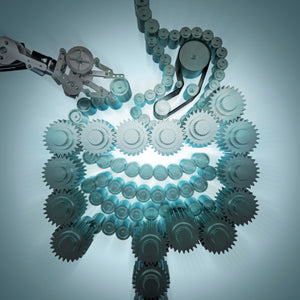Maintaining an Efficient Digestive Engine
June 15, 2015

Our digestive organs are very intricate and make up one of the largest systems in our body. If it were removed, it would stretch a staggering 25-30 feet from end to end. In very basic terms, its function is to process the food we eat into smaller molecules and eliminate waste. The digestive process is quite complex, and is a very coordinated effort that begins before we even take a bite. The sounds and smells of food, or even the thought of food, can send signals to the brain to prepare the way for food to enter our digestive tract. The primary purpose of food is to provide fuel or energy for our body, but it needs to be changed into smaller molecules of nutrients that can be absorbed into our blood and carried to the hundred trillion cells inside us.
As we dig into our meal, we probably don’t give a second thought to what happens to it as we eat, where it goes, or what it is doing inside us long after the meal is finished. The journey it takes, and the entire digestive process begins in our mouth when we chew and heads down our esophagus when we swallow until it reaches the acidic environment of the stomach where it is broken down further.
Once the food moves from the stomach into the small intestine, the hard work of digestion begins – breaking down the nutrients and absorbing them into the bloodstream. It is important that this is done efficiently, as maldigestion of food can interfere with the digestive process, including depriving your body of vital nutrients, but also, large chunks of partially digested food left in the intestines can become a breeding ground for bad bacteria. The negative consequences of which are gas and bloating.
The probiotic bacteria Lactobacillus bulgaricus plays a particularly important role in digestion by helping create a slightly acidic environment that’s necessary for optimum intestinal health as well as preventing harmful pathogenic bacteria from growing. It also helps the body break down enzymes such as lactose. This is very helpful to people who cannot tolerate dairy products and it’s also instrumental in the digestion of the essential nutrients carbohydrates and proteins.
Most importantly, Lactobacillus bulgaricus have proteolytic activity, meaning they break down proteins into amino acids – in a way, the bacteria can help ‘pre-digest’ our food for us, making digestion more efficient. Simply put, the more you can do to help the digestive process early on the cycle, the more fully digested the food will be as it moves into the large intestine, which directly reduces the potential for gas and bloating.
To give your body a little helping hand, Natren has developed Gastro-pH – a convenient and delicious probiotic in a chewable wafer form designed to be taken on-the-go. Each serving of two chewable wafers of Gastro-pH contains a minimum of 1 billion cfu of Lactobacillus bulgaricus LB-51 super strain. Our customers tell us that they like to layer Natren Healthy Trinity with Gastro pH as needed for additional support. We particularly recommend this layering approach for people who are predisposed to gas and bloating. They are easy to take, easy to carry, and provide a simple way to give your digestion a little boost before meals, or as needed to help prevent indigestion.
The post Maintaining an Efficient Digestive Engine appeared first on Natren Probiotics Blog.




Leave a comment